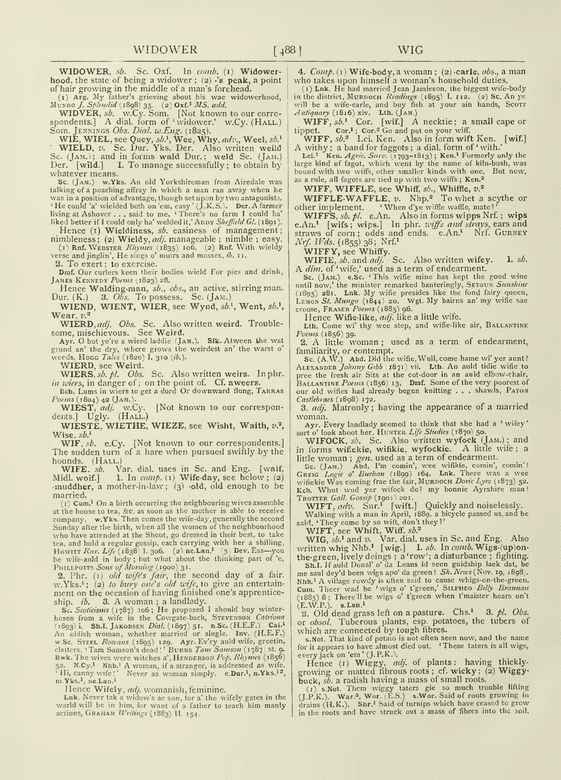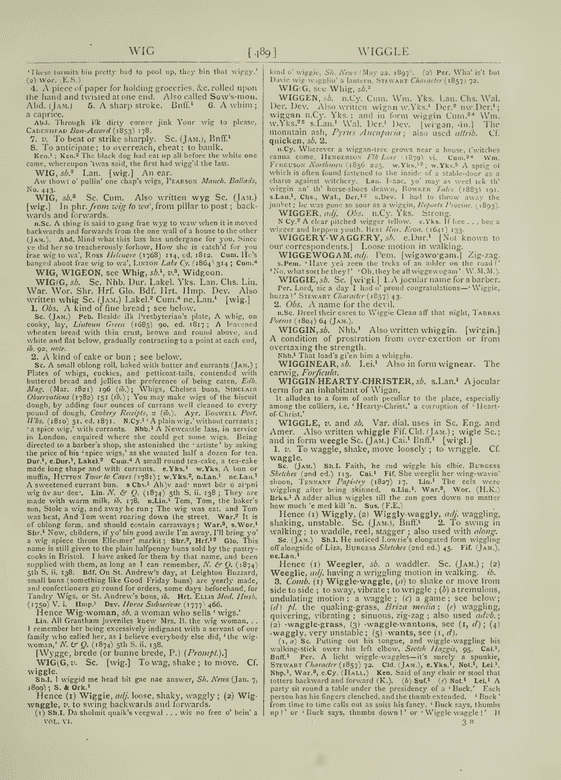Wig
Source : Wright, Joseph English Dialect Dictionary web : https://eddonline4-proj.uibk.ac.at/edd/main.html
WIG, sb.1 and v. Var. dial. uses in Sc. and Eng. Also written whig Nhb.1 [wig.] 1. sb. In comb. Wigs-(up)on-the-green, lively doings; a ‘row’; a disturbance; fighting. Sh.I. If auld Donal' o' da Leans id seen guidship laek dat, be me saul dey'd been wigs apo' da green! Sh. News (Nov. 19, 1898). Nhb.1 A village rowdy is often said to cause whigs-on-the-green. Cum. Theer wad be ‘wigs o' t'green,’ Silpheo Billy Brannan (1885) 8; There'll be wigs o' t'green when t'maister hears on't (E.W.P.). s.Lan.1 2. Old dead grass left on a pasture. Chs.1 3. pl. Obs. or obsol. Tuberous plants, esp. potatoes, the tubers of which are connected by tough fibres. s.Not. That kind of potato is not often seen now, and the name: for it appears to have almost died out. ‘These taters is all wigs, every jack on 'em’ (J.P.K.). Hence (1) Wiggy, adj. of plants: having thickly-growing or matted fibrous roots; cf. wicky; (2) Wiggy-buck, sb. a radish having a mass of small roots. (1) s.Not. Them wiggy taters gie so much trouble lifting (J.P.K.). War.3, Wor. (E.S.) s.Wor. Said of roots growing in drains (H.K.). Shr.1 Said of turnips which have ceased to grow in the roots and have struck out a mass of fibres into the soil. ‘These turmits bin pretty bad to pool up, they bin that wiggy.’ (2) Wor. (E.S.) 4. A piece of paper for holding groceries, &c. rolled upon the hand and twisted at one end. Also called Sow's-mou. Abd. (Jam.) 5. A sharp stroke. Bnff.1 6. A whim; a caprice. Abd. Through ilk dirty corner jink Your wig to please, Cadenhead Bon-Accord (1853) 178. 7. v. To beat or strike sharply. Sc. (Jam.), Bnff.1 8. To anticipate; to overreach, cheat; to baulk. Ken.1; Ken.2 The black dog had eat up all before the white one came, whereupon 'twas said, the first had wigg'd the last.
WIG, sb.2 Lan. [wig.] An ear. Aw thowt o' pullin' one chap's wigs, Pearson Manch. Ballads, No. 443.
WIG, sb.3 Sc. Cum. Also written wyg Sc. (Jam.) [wig.] In phr. from wig to wa’, from pillar to post; backwards and forwards. n.Sc. A thing is said to gang frae wyg to waw when it is moved backwards and forwards from the one wall of a house to the other (Jam.). Abd. Mind what this lass has undergane for you, Since ye did her so treacherously forhow, How she is catch'd for you frae wig to wa', Ross Helenore (1768) 114, ed. 1812. Cum. He's banged aboot frae wig to wa', Linton Lake Cy. (1864) 314; Cum.4
WIG, WIGEON, see Whig, sb.1, v.3, Widgeon.
WIG, WIGG, sb. Sc. Nhb. Dur. Lakel. Yks. Lan. Chs. Lin. War. Wor. Shr. Hrf. Glo. Bdf. Hrt. Hmp. Dev. Also written whig Sc. (Jam.) Lakel.2 Cum.4 ne.Lan.1 [wig.]
- Obs. A kind of fine bread; see below. Sc. (Jam.) Peb. Beside ilk Presbyterian's plate, A whig, on cooky, lay, Lintoun Green (1685) 90, ed. 1817; A leavened wheaten bread with thin crust, brown and round above, and white and flat below, gradually contracting to a point at each end, Lintoun Green 92, note.
- A kind of cake or bun; see below. Sc. A small oblong roll, baked with butter and currants (Jam.); Plates of whigs, cuckies, and petticoat-tails, contended with buttered bread and jellies the preference of being eaten, Edb. Mag. (Mar. 1821) 196 (JAM.); Whigs, Chelsea buns, Sinclair Observations (1782) 151 (JAM.); You may make wigs of the biscuit dough, by adding four ounces of currans well cleaned to every pound of dough, Cookery Receipts, 2 (JAM.). Ayr. Boswell Poet. Wks. (1810) 51, ed. 1871. N.Cy.1 ‘A plain wig,’ without currants; ‘a spice wig,’ with currants. Nhb.1 A Newcastle lass, in service in London, enquired where she could get some wigs. Being directed to a barber's shop, she astonished the ‘artiste’ by asking the price of his ‘spice wigs,’ as she wanted half a dozen for tea. Dur.1, e.Dur.1, Lakel.2 Cum.4 A small round tea-cake, a tea-cake made long shape and with currants. e.Yks.1 w.Yks. A bun or muffin, Hutton Tour to Caves (1781); w.Yks.2, n.Lan.1 ne.Lan.1 A sweetened currant bun. s.Chs.1 Ah)v aad· nuwt bŭr ŭ ai·pni wig v̆ au· dee·. Lin. N. & Q. (1874) 5th S. ii. 138; They are made with warm milk, N. & Q. 178. n.Lin.1 Tom, Tom, the baker's son, Stole a wig, and away he run; The wig was eat, and Tom was beat, And Tom went roaring down the street. War.2 It is of oblong form, and should contain carraways; War.3, s.Wor.1 Shr.1 Now, childern, if yo' bin good awile I'm away, I'll bring yo' a wig apiece throm Ellesmer' markit; Shr.2, Hrf.1 Hrf.2 Glo. This name is still given to the plain halfpenny buns sold by the pastrycooks in Bristol. I have asked for them by that name, and been supplied with them, as long as I can remember, N. & Q. (1874) 5th S. ii. 138. Bdf. On St. Andrew's day, at Leighton Buzzard, small buns (something like Good Friday buns) are yearly made, and confectioners go round for orders, some days beforehand, for Tandry Wigs, or St. Andrew's buns, N. & Q. Hrt. Ellis Mod. Husb. (1750) V. i. Hmp.1 Dev. Horae Subsecivae (1777) 466. Hence Wig-woman, sb. a woman who sells ‘wigs.’ Lin. All Grantham juveniles knew Mrs. B. the wig woman... I remember her being excessively indignant with a servant of our family who called her, as I believe everybody else did, ‘the wig-woman,’ N. & Q. (1874) 5th S. ii. 138. [Wygge, brede (or bunne brede, P.) (Prompt.).]
WIG, WIGG, v. Sc. [wig.] To wag, shake; to move. Cf. wiggle. Sh.I. I wiggid me head bit gae nae answer, Sh. News (Jan. 7, 1899); Sh.&Ork.1 Hence (1) Wiggie, adj. loose, shaky, waggly; (2) Wig-waggle, v. to swing backwards and forwards. (1) Sh.I. Da sholmit quaik's veegwal... wis no free o' bein' kind o' wiggie, Sh. News (May 22, 1897). (2) Per. Wha' is't but Davie wig-wagglin' a lantern, Stewart Character (1857) 72.
WIG, WIGG, see Whig, sb.2
WIG, sb. s.Ayr. Slang word for a penny. (M.J.F.)

